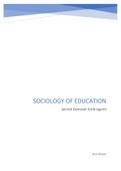Resume
Summary Sociology of education (011366)
- Établissement
- Vrije Universiteit Brussel (VUB)
In this summary you will find a concise but complete summary of Demanet's course of sociology of education. You will find the slides together with extra information given in class, together with pictures (taken from the slides) to make it more fun and easier to study. Good luck!
[Montrer plus]



